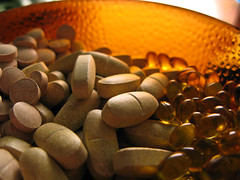Low Vitamin D Linked to NFL Injuries.
Low levels of vitamin D can increase a professional athlete's chances of injury, according to study findings by Summit Medical Group, a study of 89 players from the NFL's New York Giants during their 2010 pre-season evaluations, 80 percent of the players were found to have insufficient levels of vitamin D.
 Findings also revealed that African American players and players who suffered muscle injuries had significantly lower levels. For the study they analyzed data on the number of players who had lost time because of muscle injuries. Vitamin D levels were then classified based on player race and time lost because of muscle injury.
Findings also revealed that African American players and players who suffered muscle injuries had significantly lower levels. For the study they analyzed data on the number of players who had lost time because of muscle injuries. Vitamin D levels were then classified based on player race and time lost because of muscle injury.It was presented at the American Orthopaedic Society for Sports Medicine's (AOSSM) Annual Meeting in San Diego on Sunday July 10, 2011.
Symptoms and Health Risks attributed to Vitamin D Deficiency
Symptoms of muscle pain and bone pain can mean you have a vitamin D deficiency. However, for a lot of people, the symptoms are subtle. But even without symptoms, too little vitamin D can pose health risks.
Inadequate blood levels of the vitamin have been associated with the following:
1. Higher risk of death from heart disease
2. Cognitive impairment in older adults
3. Severe asthma in children
4. Certain forms of cancer
Vitamin D is manufactured in the body when bare skin is exposed to sunlight. The body needs vitamin D to absorb calcium, a mineral essential to bone structure, muscle function and cardiovascular health. According to the Linus Pauling Institute at Oregon State University, a deficiency of vitamin D can cause muscle weakness and pain and low bone-mineral density in both adults and children. Studies have shown a correlation between the incidence of traumatic injuries and vitamin D status.
Research suggests that vitamin D can play a role in the prevention and treatment of a number of different conditions, including type1 and type 2 diabetes, hypertension, glucose intolerance, and multiple sclerosis.
New research has connected vitamin-D deficiency to higher risk of muscle injuries in athletes.
Researchers looked at 89 football players from a single NFL team and conducted lab tests of vitamin D levels in the spring of 2010. The mean age of the players was 25.The team gave the researchers data to allow them to determine which players had lost time because of muscle injuries.The results showed that 27 players had deficient levels of the sunshine vitamin, and 45 more had levels consistent with insufficiency.
Only 17 players had levels within normal limits. Sixteen players had suffered a muscle injuryand the mean vitamin-D level of the injured players was 19.9 nh/mL, a deficient value.
Causes of Vitamin D Deficiency
Vitamin D deficiency can occur for a number of reasons:
IF
1. You don't consume the recommended levels of the vitamin over time. This is likely if you follow a strictly vegetarian diet, because most of the natural sources are animal-based, including fish and fish oils, egg yolks, cheese, and beef liver.
2. You have limited exposure to sunlight. Because the body makes vitamin D when your skin is exposed to sunlight, you may be at risk of deficiency if you are homebound, reside in northern latitudes, wear long robes or head coverings for religious reasons, or have an occupation that prevents sun exposure.
3. You have dark skin. The pigment melanin reduces the skin's ability to make vitamin D in response to sunlight exposure. Some studies show that older adults with darker skin are at higher risk of vitamin D deficiency.
4. Your kidneys cannot convert vitamin D to its active form. With aging, the kidneys are less able to convert vitamin D to its active form, thus increasing the risk of vitamin D deficiency.
5. Your digestive tract cannot adequately absorb vitamin D. Some medical problems, including Crohn's disease, cystic fibrosis, and celiac disease, can affect your intestine's ability to absorb vitamin D from the food you eat.
6. You are overweight. Vitamin D is extracted from the blood by fat cells, affecting its release into the circulation. People with a body mass index of 30 or more often have low blood levels of vitamin D
Treatment for Vitamin D Deficiency
Treatment for vitamin D deficiency involves getting more vitamin D -- through diet, supplements, and/or through spending more time under the sun. Although there is no consensus on vitamin D levels required for optimal health -- and it likely differs depending on age and health conditions -- a concentration of less than 20 nanograms per milliliter is generally considered inadequate, requiring treatment.
Simple blood test can be obtained to know if serum concentrations are within the acceptable normal limit, and those who are found to be deficient or on the lower end of normal with muscle aches, recurrent stress fractures, or other symptoms will be placed on some form of supplementary treatment protocol.
Guidelines from the Institute of Medicine call for increasing the recommended dietary allowance (RDA) of vitamin D to 600 international units (IU) for everyone aged 1-70, and raising it to 800 IU for adults older than 70 to optimize bone health. If you don't spend much time in the sun or always are careful to cover your skin, as sunscreen inhibits vitamin D production, you should speak to your doctor about taking a vitamin D supplement, especially if you have other risk factors for vitamin D deficiency as mentioned earlier.
Many foods and drinks have fortified vitamin D as well, and also many doctor's offices are offering supplementation or at least recommendations for such in their offices.
Article by Dr. Brian Timm of the Family Foot and Leg Center, PA



